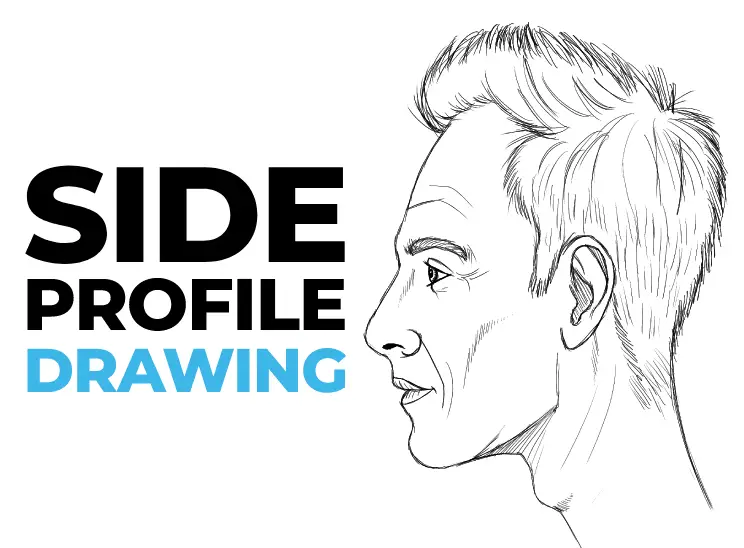


When learning to draw heads, one of the easiest things you can start out with is a side profile drawing.
At that angle, there’s no perspective involved, just like when you draw a face straight from the front.
It’s very schematic – and it all comes down to proportions (and a bit of anatomy).
This makes it perfect for beginners: If you can’t draw faces yet, it’s quick to learn and you can produce good results fast.
Let’s do just that right now!
Table of Contents
A side profile drawing can be divided into simple steps. You start with a circle, divide it into parts, draw some guides, and off you go.
Here’s how it works:
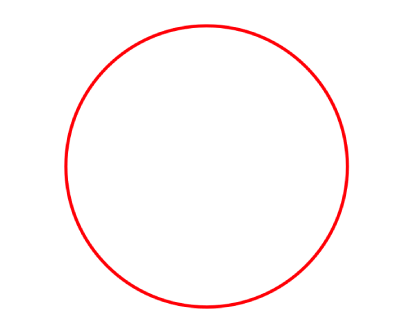
It all starts with a simple circle. Obviously, the head isn’t a ball, but this keeps things simple and acts as a base to build upon.
This is the first step and the easiest. Or is it? For many people, this is harder than it may seem. Who can draw a perfect circle anyway? I can’t, that’s for sure.
Draw a straight line that divides the circle in half vertically. Then do the same, but horizontally. Simple.
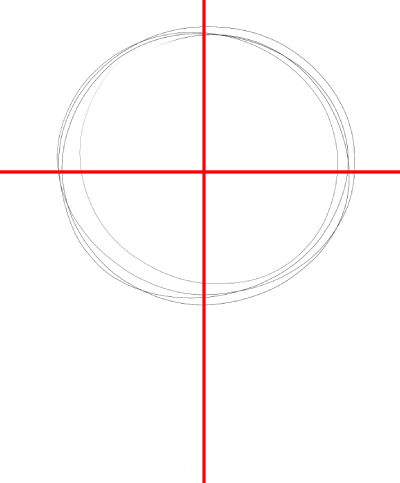
The third step is a bit harder, but it’s one of the most important steps. In the end, these four lines will make or break your side profile drawing.
Get these wrong and your proportions will just not look right.
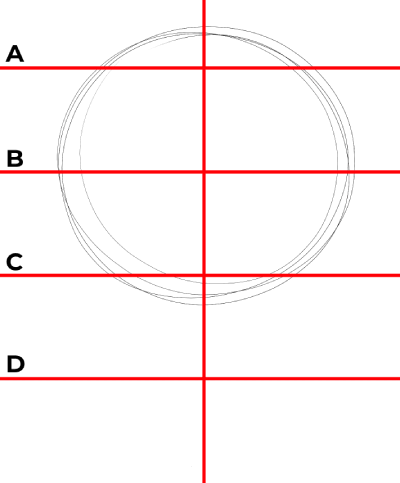
Next, let’s draw the eye line. This will be our final guide.
The eye line sits right at the center of the head, halfway between the top and bottom of the head:
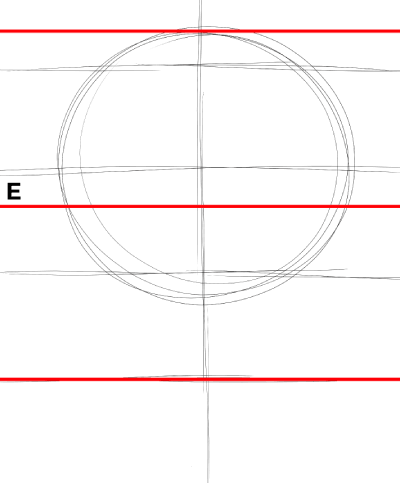
The eye line will be line E.
I prefer to draw the jaw shape next. This way, the drawing already starts resembling a head.
Note: This is not the final shape. It’s more like a basic shape to act as a base to build upon. The final shape will be heavily influenced by the nose, lips and chin.
First, draw a straight line at the edge of the circle:
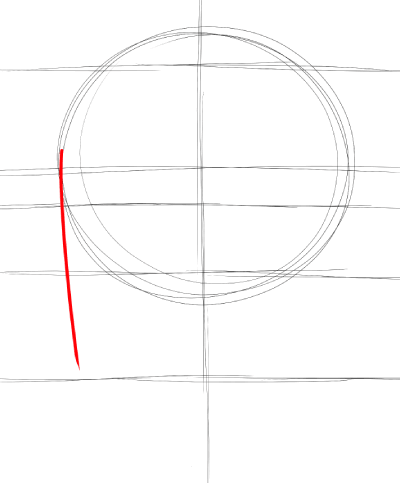
Second, draw the chin and the lower jaw line. To find the angle of the lower jaw line, you can draw a straight line from the chin so that it touches the edge of the circle:
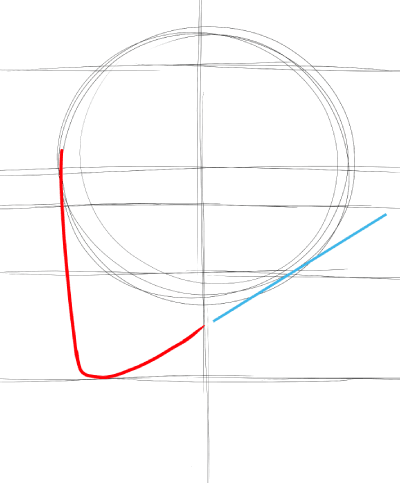
The jaw runs until the circle’s center line, where it connects vertically:
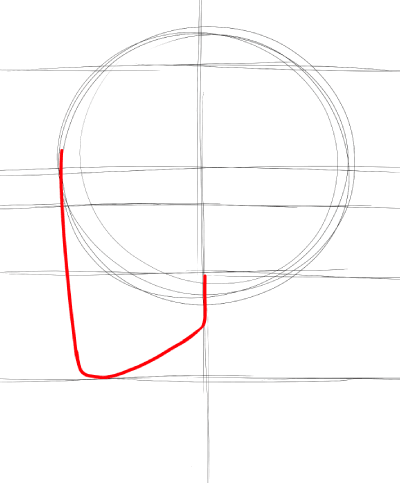
The neck is pretty easy to draw. Just draw two slightly curved lines – one at the back of the circle and one somewhere around the middle of the jaw:
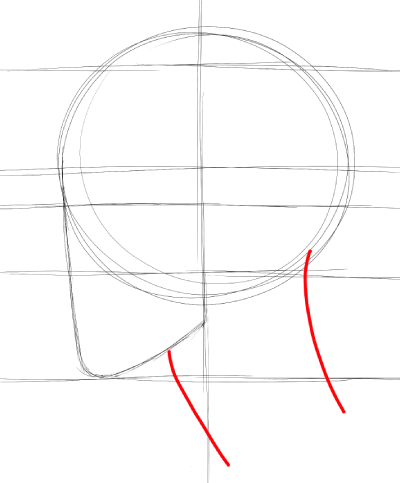
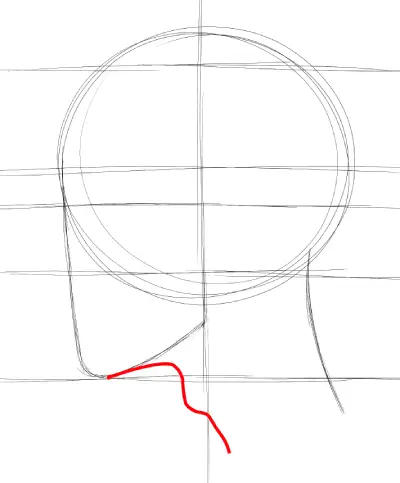
Draw an oval shape that represents the ear. The ear starts behind the jaw, right at the center line of the circle (or a little bit behind it, depending on the person). It sits right between line B and C.
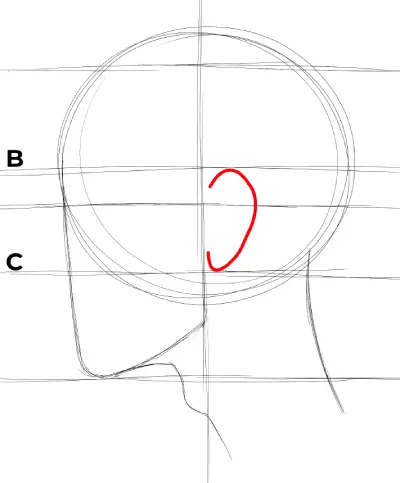
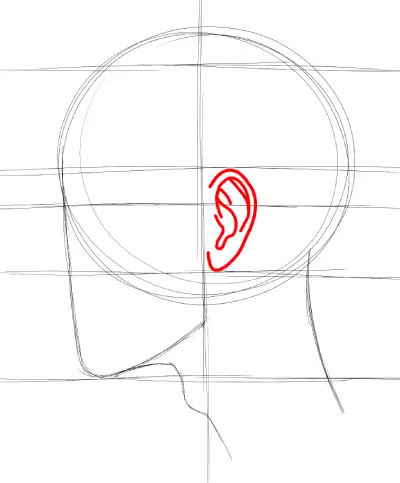
In this step, we’ll draw the nose. You can start with a basic triangle shape. The nose sits between Line B and C:
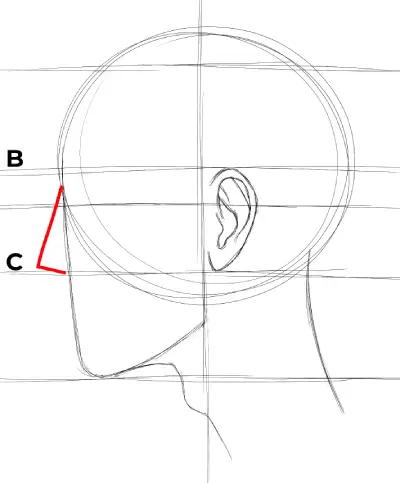
The angle of the nose can vary a bit – some noses are longer, some shorter:
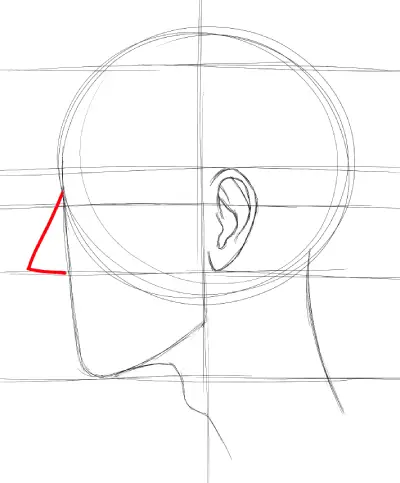
Some noses have a very pronounced nasal bone:
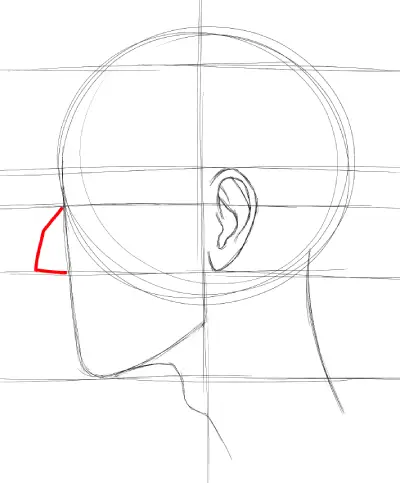
Finally, round off the lines, draw the nostrils and the nasal hole:
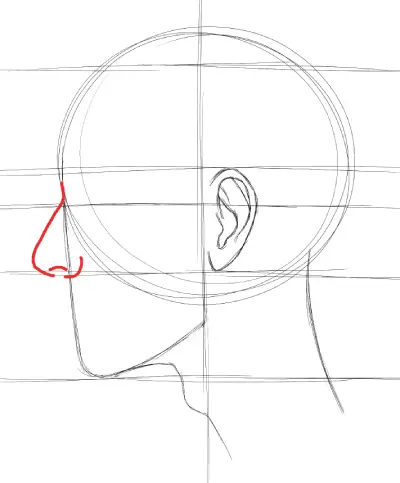
The lips can be a bit tricky to draw if you don’t know the correct proportions. We haven’t drawn any guides for these yet …
… but luckily, there’s a way to make it much easier.
Can you guess it already? Yes, thirds, once again:
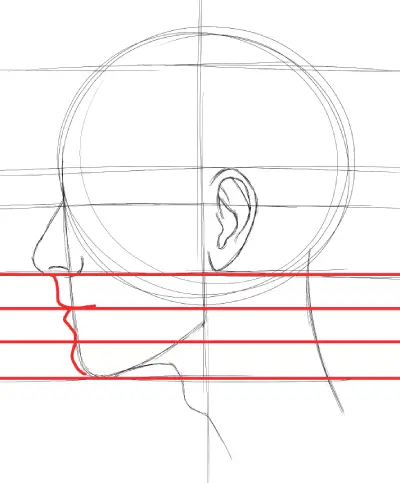
The lip line is right on the upper of the two lines you just drew.
There’s even a way to find the bottom of the lower lip: draw one more line between the new lines:
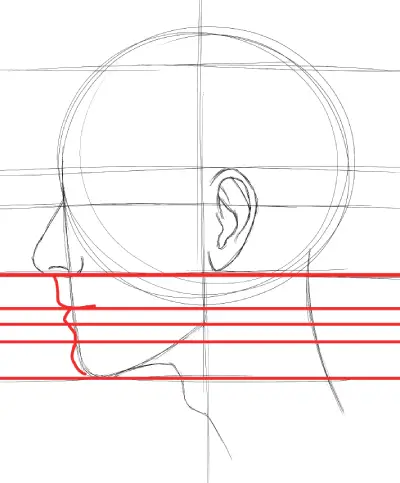
Finally, we come to the most important part of the face: the eyes.
We already drew the guide for the eyes in step 4, remember? It’s line E.
The eyes sit exactly on that line, in the middle of the head:
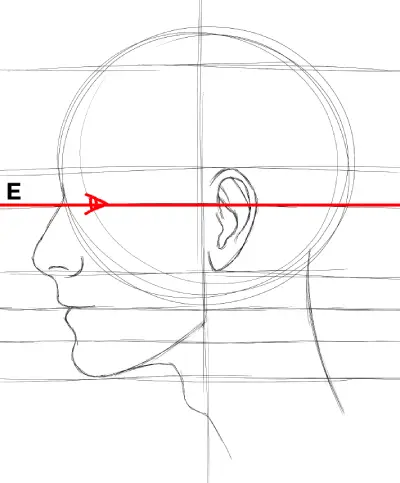
Horizontally, the eyes roughly start where the lips end:
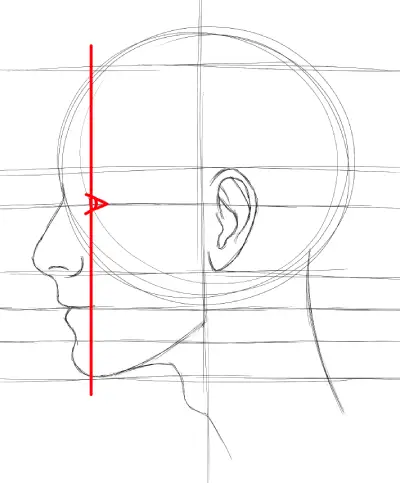
The top of the eyebrows touches line B. The eyebrows run in a curved line above the eye:
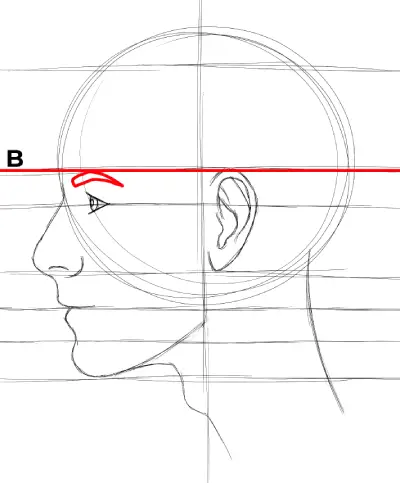
As I said in the very first step, the head obviously isn’t shaped like a ball.
Now it’s time to refine the shape a bit more:
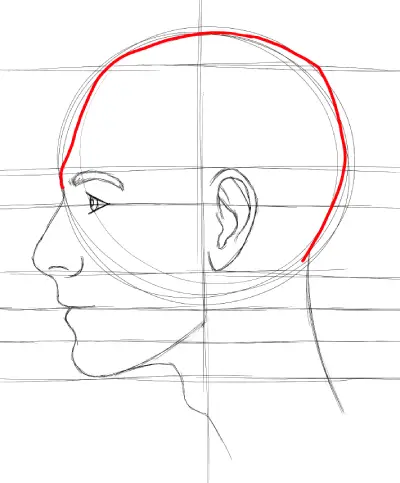
In general, the forehead is flatter and the whole head isn’t as round as a circle.
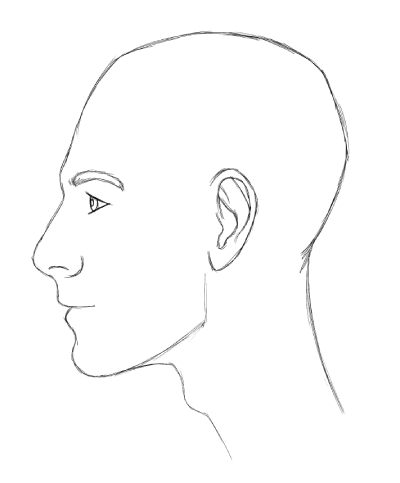
Our drawing could already pass as a bald person like me… but since the majority of people in this world have hair: Let’s add some!
You can be pretty creative here. Remember that line A is the hair line (drawn in step 3) – that’s where the bangs start.
Other than that, I recommend that you look at some images on google search for inspiration.
Here’s an example of how you could draw hair:
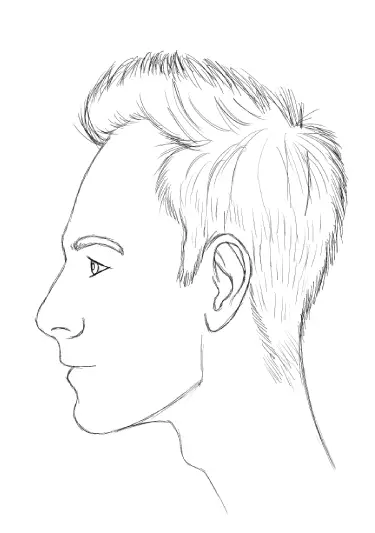
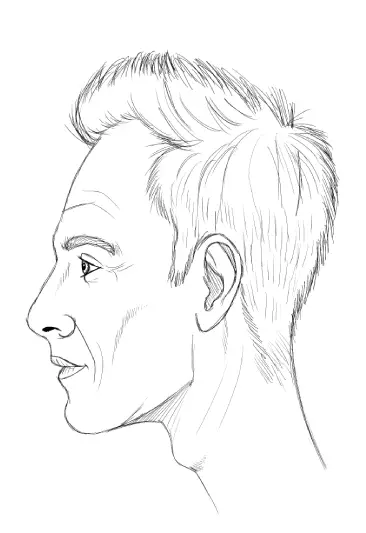
Depending on how many details you drew so far (and how detailed you want your drawing to look), you can now add some more.
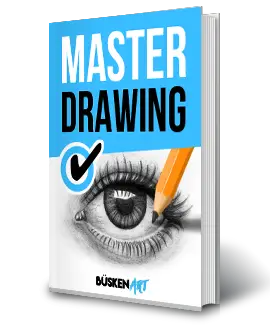
Learn how to MASTER drawing in 5 easy steps with my FREE PDF guide!
Discover a methodical way to learn drawing effectively!
If you are stuck and need some more visual demonstration, check out master Stan Prokopenko casually drawing a great side profile:
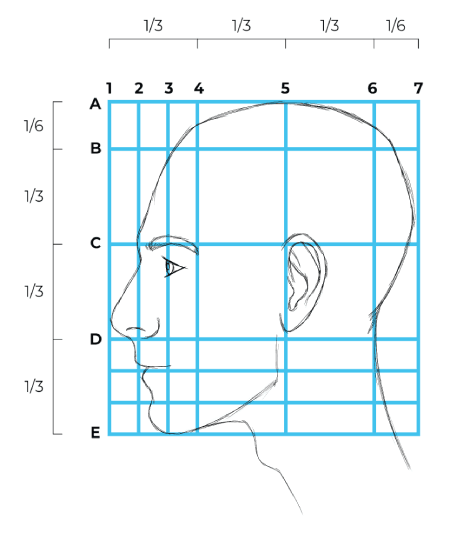
This proportions grid works the following way:
About this method:
This method is very precise. The proportions of heads can vary quite a bit from person to person, but this comes close to being a perfect model. It almost leaves no room for error and makes it easy to create an accurate drawing.
That being said, I don’t find it very helpful.
Why? Well, who would want to draw such a “mathematical“ grid every time when drawing a head? I wouldn’t, that’s for sure. It doesn’t sound like fun to me.
Also, it’s not very practical. Dividing into thirds is one thing, but you can’t really do it intuitively because the head is three and a half units wide and high. Good luck measuring that by eye.
I prefer another method:
Method #1 seems to be the standard way to get correct proportions in a side profile.
Since it’s hard to use, I developed another method: The Büsken-method.
Just kidding. It’s so simple that it doesn’t need a name. I just haven’t seen anyone use it like this.
It looks like this:
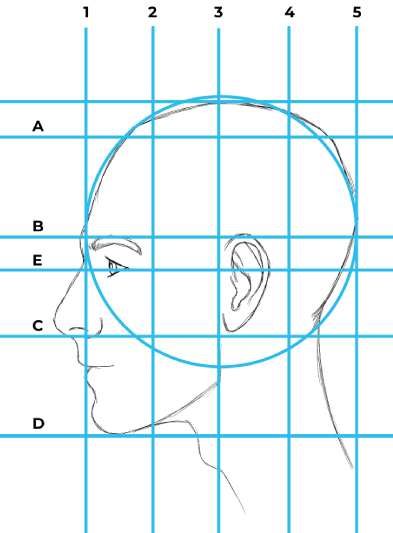
Here’s how it works:
Just take our drawing from step 4 and draw 4 more vertical lines, so that you get horizontal quarters.
The rest pretty much works itself out. For the nose, see step 8 and for the lips, step 9. I don’t think you need any more vertical lines to draw these – it shouldn’t be hard to draw them by eye.
Both method #1 and method #2 work well to establish believable proportions when drawing a head from the side.
These little differences exist – and they’re what makes your portraits more human.
Just beware of too extreme proportions or your drawings will start to look like a caricature. Unless that’s what you want? Then go for it!